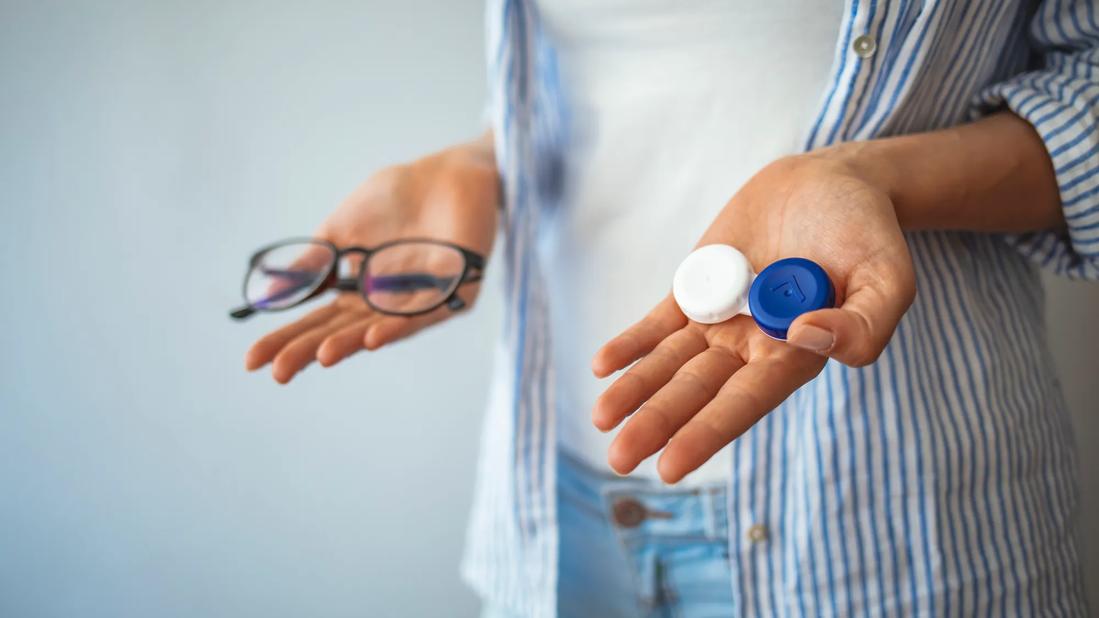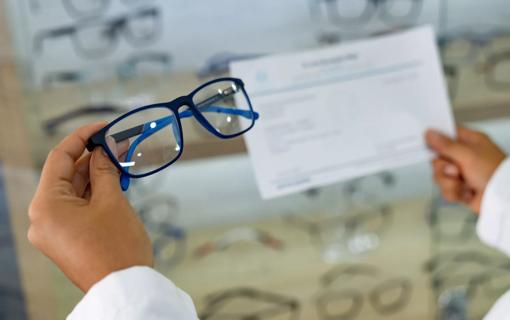Both have pros and cons, but ultimately it’s a personal decision only you can make

If you’re nearsighted or farsighted, you’ve probably considered whether you should use eyeglasses or contacts to correct your vision.
Advertisement
Cleveland Clinic is a non-profit academic medical center. Advertising on our site helps support our mission. We do not endorse non-Cleveland Clinic products or services. Policy
So, when it comes to contacts vs. glasses, is one better than the other?
Both options come with pros and cons. Eyeglasses are easy to use and don’t require any special care or cleaning, while contacts offer advantages such as ease of movement when participating in sports or other activities and offer better peripheral vision.
Contacts require special cleaning and care, while eyeglasses may be a hindrance during certain activities.
How do you decide what’s right for you?
Optometrist Wes Immler, OD, discusses the advantages and disadvantages of glasses and contacts and how to choose.
Whether you go with contacts or glasses, it’s up to you and factors like your lifestyle, personal style and preference, says Dr. Immler.
When first developed, contact lenses were only available as hard lenses. Today’s hard lenses, called gas permeable, are much improved. They can be worn for up to a year without needing to be replaced as long as they’re properly cared for.
“Typically, the people who choose hard lenses have eye conditions that don’t allow them to wear a soft lens,” clarifies Dr. Immler. “They might have an irregularly shaped eye or a condition called keratoconus, which causes thinning of the cornea.”
Advertisement
The vast majority of Dr. Immler’s patients (around 90% to 95%) choose soft lenses. Soft contact lenses are typically thinner, lighter and more comfortable than hard lenses. Lens manufacturers may use a silicone hydrogel material that allows more oxygen to reach the eye. Soft contact lenses come in three varieties:
Eyeglasses have been around for centuries, evolving over time to use more modern designs and materials. When it comes to eyeglasses, there are two different types:
Plastic or polycarbonate materials are typically used to make most eyeglass lenses. They tend to be lightweight and can come with certain coatings to help reduce glare and reflections.
“Glasses lenses are made differently to correct different vision issues. Lenses are made in a concave shape to correct myopia or nearsightedness,” explains Dr. Immler. “They’re made in a convex shape to correct hyperopia or farsightedness. Bifocal lenses are made to have one power at the top to help with distance vision and a different, more magnified, power at the bottom to help with reading.”
Thinking about trying contacts? Dr. Immler outlines the following benefits:
Advertisement
But there are some downsides to wearing contacts. Here are a few things to consider:
When it comes to glasses there are a lot of benefits such as:
Advertisement
You may want to consider the following disadvantages of wearing glasses:
Advertisement
Yes. Many people have a pair of eyeglasses and contact lenses that they can rotate between. This can come in handy depending on your lifestyle.
For example, you may prefer to wear your eyeglasses during the day while you’re at work. But then, you may opt to switch to your contacts when you work out or hang out with friends.
“Many people wear both contacts and glasses. They like the flexibility of having both options depending on the activity they’re doing,” notes Dr. Immler. “It’s also always a good idea to have a backup pair of glasses even if you mostly wear contacts. This way, you can wear your glasses if you happen to get an eye infection or can’t wear your contacts for some reason. It’s also good to give your eyes a break from contacts occasionally, especially at the end of the day.”
No. Your prescription for contacts and glasses is different because your contacts sit directly on your eye. So, during an eye exam, your optometrist will take different measurements for your eyeglasses and your contacts.
For example, your contact prescription includes additional information/measurements such as:
Your contact prescription will also include the power of vision correction, the brand and type of lenses, as well as an expiration date.
“When you purchase contacts, your optometrist will match your eye’s shape and curvature to the lens,” says Dr. Immler. “This allows tears to get under the lens to provide the eye nutrients and oxygen.”
Your optometrist will also train you on how to apply and care for your lenses.
Are contacts better than glasses? There’s not one right answer. Contact lenses and eyeglasses are both good options for those who need help correcting their vision.
| Contacts | Eyeglasses |
|---|---|
| Better peripheral vision. | Easy to use. |
| Difficult to damage. | Don’t need to be replaced often. |
| Aren’t obvious on your face. | Many styles and colors. |
| Many options to fit your needs. | Don’t increase your risk of eye infections. |
| Contacts | |
| Better peripheral vision. | |
| Eyeglasses | |
| Easy to use. | |
| Difficult to damage. | |
| Eyeglasses | |
| Don’t need to be replaced often. | |
| Aren’t obvious on your face. | |
| Eyeglasses | |
| Many styles and colors. | |
| Many options to fit your needs. | |
| Eyeglasses | |
| Don’t increase your risk of eye infections. |
When it comes to costs, the amount you spend on either option can depend on how often you need to replace your contacts or glasses and other factors like features, materials, coatings and if you have more complex vision issues.
But the choice of whether you should go with contacts over eyeglasses (or wear both) is up to you and what makes the most sense for your lifestyle.
“The best thing to do to help decide whether glasses or contacts are best for you is to have a comprehensive eye exam,” advises Dr. Immler. “Your eye doctor can then assess your vision and eye health and discuss your individual needs. We can lay out which glasses and contact lens options might work best for you, but ultimately, the final decision is up to you.”

Sign up for our Health Essentials emails for expert guidance on nutrition, fitness, sleep, skin care and more.
Learn more about our editorial process.
Advertisement

A correct prescription helps your eyes see clearly — but as natural changes occur, you may need stronger or different eyeglasses

It usually takes anywhere from a couple of days to a few weeks to get fully adjusted

The lifespan of contact lenses depends on whether you have reusable or disposable lenses

While rare, it is possible to have an allergic reaction to materials used in contact lenses or ingredients found in contact solution

Keep your eyes healthy by not sleeping in your contacts, properly caring for your lenses and wearing eye protection when necessary

While it may seem harmless, showering — or even swimming or washing your face — with contacts in can cause sensitivity to light, irritation and even an infection

Even napping with contacts in can lead to eye infections, lens displacement and dry eyes

Your eye prescription reveals a lot about your eye health, including how they’re shaped, how well you see and what your new glasses can do for your sight

Even small moments of time outdoors can help reduce stress, boost mood and restore a sense of calm

A correct prescription helps your eyes see clearly — but as natural changes occur, you may need stronger or different eyeglasses

Both are medical emergencies, but they are very distinct events with different causes